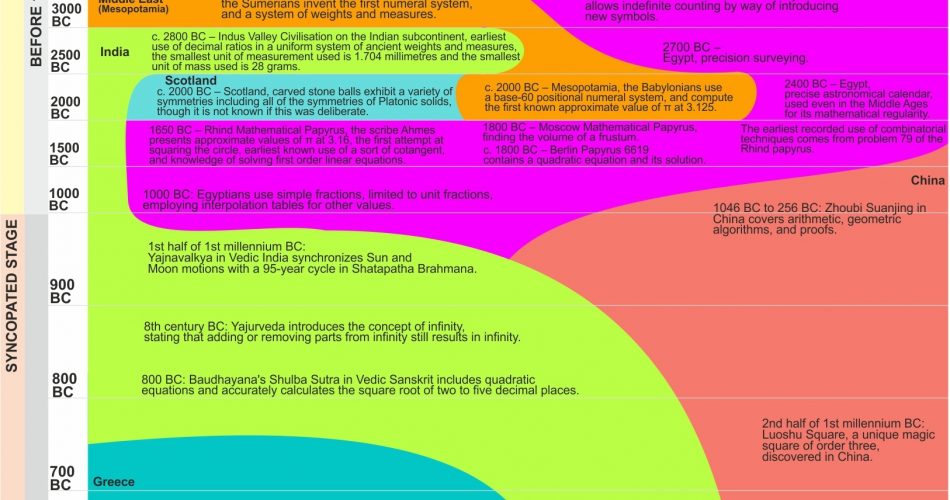
Mathematics, often called the universal language, has evolved across centuries, shaping our worldview and solving complex problems. From ancient civilizations to 21st-century research, it’s a timeline filled with brilliant minds, groundbreaking discoveries, and an unwavering pursuit of knowledge. Join us on a journey through key moments in mathematical history.

Ancient Wonders (1000 BCE – 500 CE)
The origins of mathematical thought can be traced back to ancient civilizations. In Mesopotamia, the Babylonians developed early mathematical systems, including the base-60 numerical system and the Pythagorean triplets. Meanwhile, the Egyptians excelled in geometry, applying mathematical principles in construction and land surveying.
Golden Age of Islam (700–1200)
During the Islamic Golden Age, mathematical knowledge flourished, with scholars like Al-Khwarizmi laying the foundations of algebra. Al-Biruni made significant contributions to trigonometry, while Omar Khayyam’s work on cubic equations and geometric solutions paved the way for future developments.
Medieval Marvels (1000–1500)
In medieval Europe, the introduction of Hindu-Arabic numerals by Fibonacci revolutionized mathematical notation. Bhaskara’s Lilavati and Bijaganita delved into geometry, algebra, and the concept of square roots, leaving an indelible mark on mathematical history.
Renaissance and Beyond (15th–18th Century)
The Renaissance saw the revival of ancient mathematical ideas, and the works of mathematicians like Tartaglia, Cardano, and Fermat set the stage for the development of calculus. John Napier’s logarithms and the invention of the slide rule further facilitated complex calculations.
Calculus and Beyond (17th–19th Century)
The 17th century ushered in the era of calculus with the groundbreaking contributions of Newton and Leibniz. Euler’s advancements in number theory and graph theory, Lagrange’s work on celestial mechanics, and Gauss’s contributions to algebraic number theory elevated mathematics to new heights.
Abstract Algebra and Set Theory (19th–20th Century)
The 19th century witnessed the formalization of abstract algebra by mathematicians like Galois and the birth of non-Euclidean geometries. Cantor’s set theory revolutionized our understanding of infinity, and the early 20th century saw the rise of mathematical logic and the foundational work of Gödel, Turing, and Church.
Quantum Leap in the 20th Century
The 20th century marked a period of unprecedented progress in various branches of mathematics. The collaboration of hundreds of mathematicians culminated in the classification of finite simple groups, a monumental achievement. In the 1930s, Turing and Gödel laid the groundwork for computer science and theoretical computer science.
Millennium Prize Problems and Beyond (21st Century)
The 21st century brought forth the Millennium Prize Problems, seven unsolved mathematical challenges, including the Poincaré conjecture, proved by Grigori Perelman in 2003. Yitang Zhang’s 2013 breakthrough on prime gaps and Maryna Viazovska’s solution to the sphere packing problem in dimension 8 showcased the ongoing vitality of mathematical research.
As we traverse this mathematical odyssey, it becomes evident that the history of mathematics is not just a sequence of isolated events but a continuum of ideas, discoveries, and innovations. From ancient times to the present day, mathematicians have shaped the way we perceive the world, unlocking the secrets of the universe one equation at a time.

